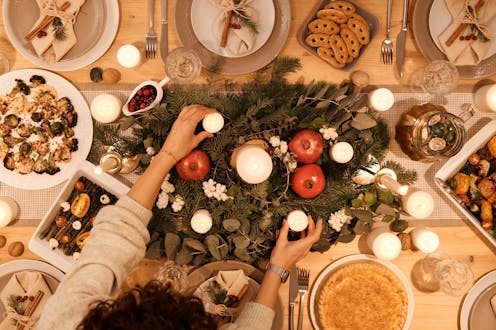I've indulged over the holidays. If I'm healthy the rest of the time, does it matter?
- Written by Emma Beckett, Senior Lecturer (Food Science and Human Nutrition), School of Environmental and Life Sciences, University of Newcastle

The holidays are often called the “silly season” – a time when we eat, drink and be merry. But these holiday indulgences can lead to feelings of guilt and fear that we’ve undone all the healthy habits from the rest of the year. But how much do you really need to worry about the impacts of holiday overeating?
Read more: Trust Me, I'm An Expert: what science says about how to lose weight and whether you really need to[1]
Yes, weight gain can happen in the holidays
There are studies[2] that show weight gain can and does occur in the silly season. But on average it’s not as dramatic as diet culture would have us believe, coming in at about 0.7kg.
However, because humans are complex and varied, and nutrition science is hard, there are studies with varied findings. Some show that despite significant increases in overall energy intake[3] and reductions in diet quality[4], weight gain doesn’t occur[5].
Importantly, much of this research comes from the northern hemisphere where the major holidays coincide with winter. And these studies focus on weight, not health. Weight is just a marker that’s convenient to measure, but health is more complicated[6].
Read more: Eat your vegetables – studies show plant-based diets are good for immunity[7]
Food is not just fuel
Food isn’t just energy and nutrients. It’s a big part of our cultures and celebrations, and contributes to social, cultural and emotional wellbeing[9].
While it’s harder to study, nourishing our souls with foods that connect us to our loved ones and our traditions is just as important as the role food plays in nourishing our bodies.
Holiday feasts are also an opportunity to share meals. Sharing meals contributes to our emotional wellbeing and happiness[10].
Say hello to homeostasis
Homeostasis[11] is a scientific term that describes how systems self-regulate. The word comes from the ancient Greek words for “similar” and “steady”.
In living things it means that biology can adapt to changes to keep things in their normal constant state. Essentially, our body is always making little constant biological changes to help things stay the same. This is how we regulate things like our body temperature, blood sugar, blood pressure and other systems important for survival.
The principles of homeostasis also apply to our eating and metabolism[12]. If we eat more for one or two holiday feast days (or even weeks) our biology works to minimise the impacts. This is also why losing weight on restrictive diets can be hard – homeostasis means as we reduce our energy intake our bodies adjust to using less energy.
So for most people, discrete periods of indulgence aren’t likely to be the major determinants of health outcomes. It’s more likely the patterns we follow most of the time will influence our long term health.
Read more: Thinking you're 'on a diet' is half the problem – here's how to be a mindful eater[13]
It’s about balance
Biology and social norms both mean restrictive diets are hard to maintain long-term[14]. Some people are more successful[15] in maintaining a balanced diet when indulging is allowed.
And now science has helped you to relax a little, a few words of caution.
Drink in moderation
Over-consumption of alcohol can cause increased risk for chronic diseases[16].
Excess alcohol consumption in the festive period increases the risk of alcohol-related harm, including accidents and violence[17].
Staying hydrated by alternating with non-alcoholic beverages helps reduce how much you drink and how bad a hangover is, but it won’t eliminate the risks.
Food safety risks
Festive eating, with sharing, travelling and over-crowded fridges increases our risks of food poisoning[19]. Summer holidays also bring the added risk of heat.
You want to share food and joy, not germs, so remember your basic food safety rules[20] like hand washing, avoiding cross contamination of uncooked meats and other foods, storing food chilled, and heating thoroughly.
It’s also a good idea to make sure you talk to your guests or hosts about food allergens to make sure everyone has a safe holiday feast.
The bottom line
What we eat is a big part of determining our health, but adding a side serving of guilt to your festive feast isn’t healthy either.
For true healthy choices, focus on balance and moderation for the bulk of the year and for most of your choices, but social and cultural eating is part of balance.
Enjoying your celebration foods doesn’t need to mean throwing away all your healthy habits, but healthy eating and healthy indulgence can co-exist if we let it.
Read more: Dieting after birth can make mum's self esteem worse[21]
References
- ^ Trust Me, I'm An Expert: what science says about how to lose weight and whether you really need to (theconversation.com)
- ^ studies (pubmed.ncbi.nlm.nih.gov)
- ^ overall energy intake (pubmed.ncbi.nlm.nih.gov)
- ^ reductions in diet quality (pubmed.ncbi.nlm.nih.gov)
- ^ weight gain doesn’t occur (digitalcommons.usu.edu)
- ^ health is more complicated (nutritionj.biomedcentral.com)
- ^ Eat your vegetables – studies show plant-based diets are good for immunity (theconversation.com)
- ^ CC BY (creativecommons.org)
- ^ social, cultural and emotional wellbeing (www.tandfonline.com)
- ^ contributes to our emotional wellbeing and happiness (link.springer.com)
- ^ Homeostasis (www.britannica.com)
- ^ eating and metabolism (www.frontiersin.org)
- ^ Thinking you're 'on a diet' is half the problem – here's how to be a mindful eater (theconversation.com)
- ^ hard to maintain long-term (www.ncbi.nlm.nih.gov)
- ^ more successful (www.sciencedirect.com)
- ^ increased risk for chronic diseases (www.cdc.gov)
- ^ including accidents and violence (www.vichealth.vic.gov.au)
- ^ CC BY (creativecommons.org)
- ^ risks of food poisoning (www.cdc.gov)
- ^ basic food safety rules (www.betterhealth.vic.gov.au)
- ^ Dieting after birth can make mum's self esteem worse (theconversation.com)

















